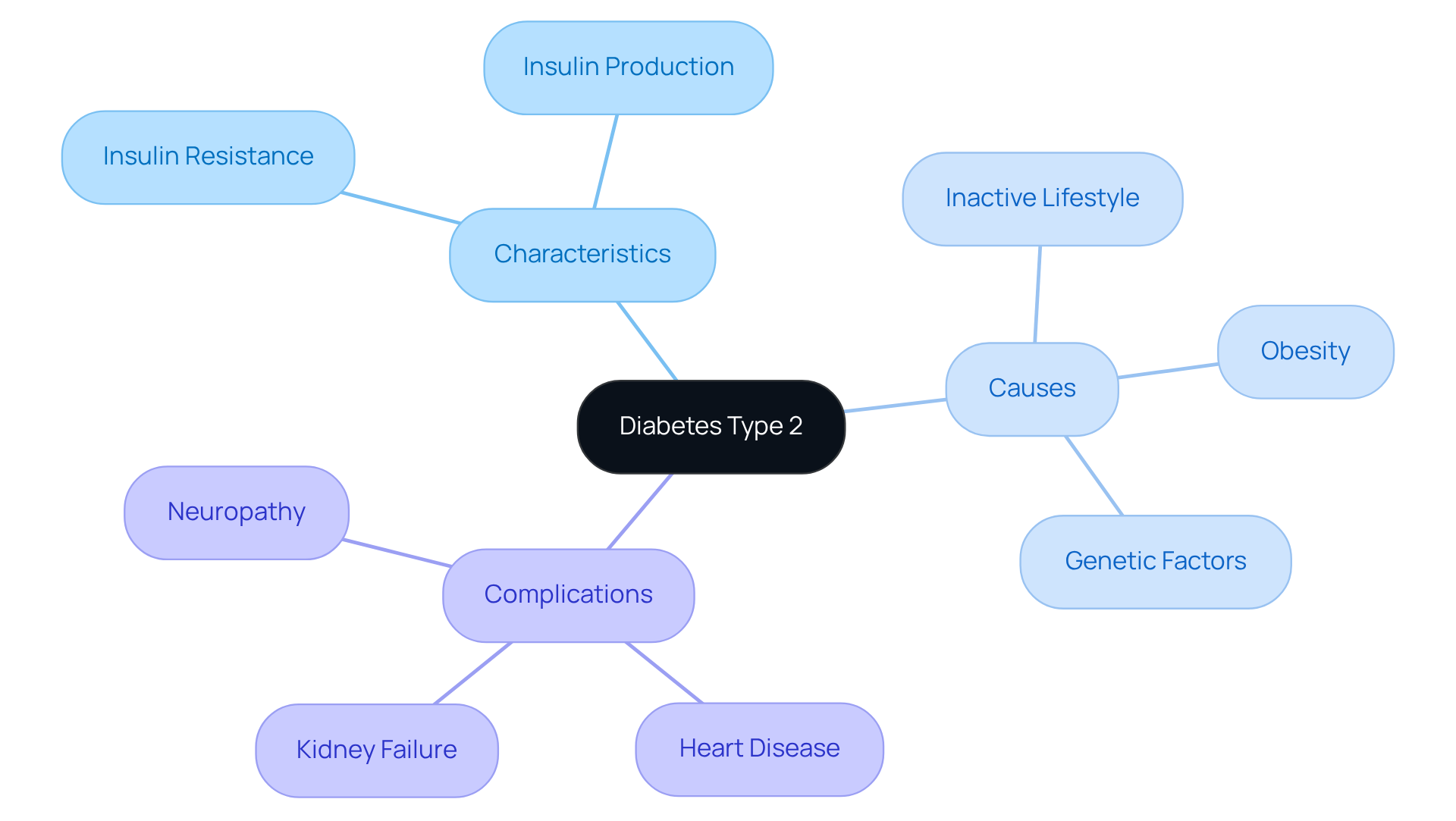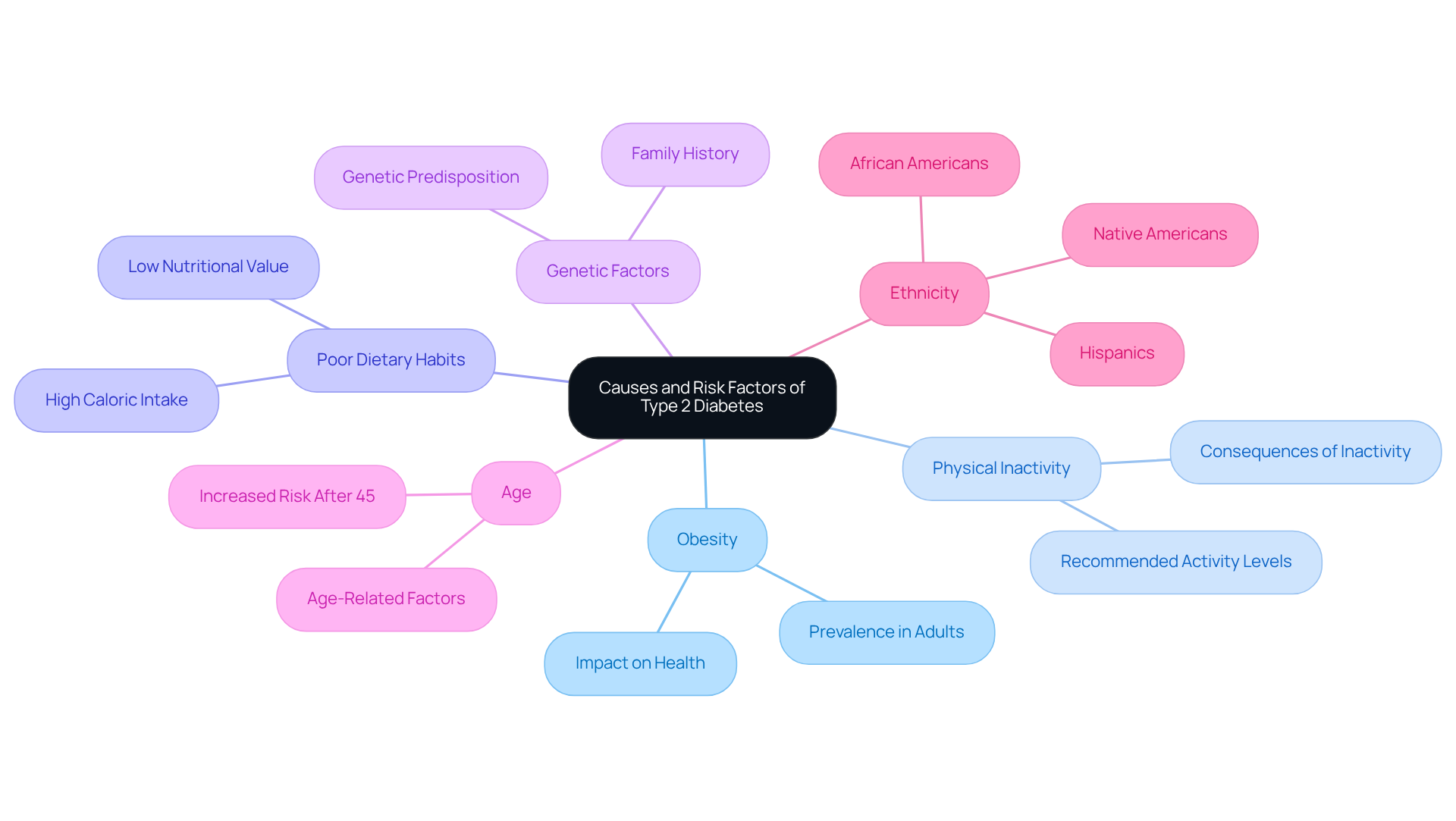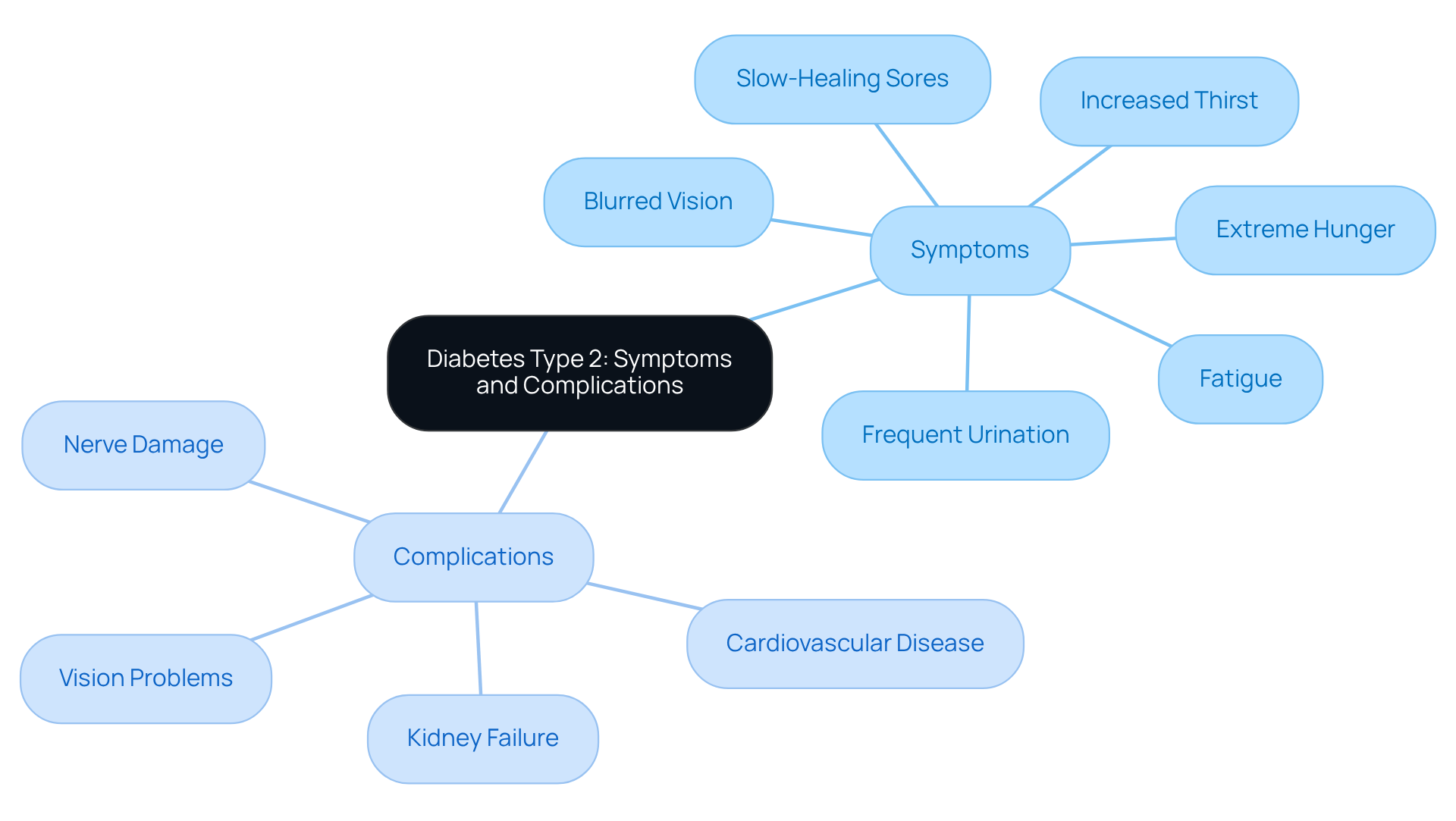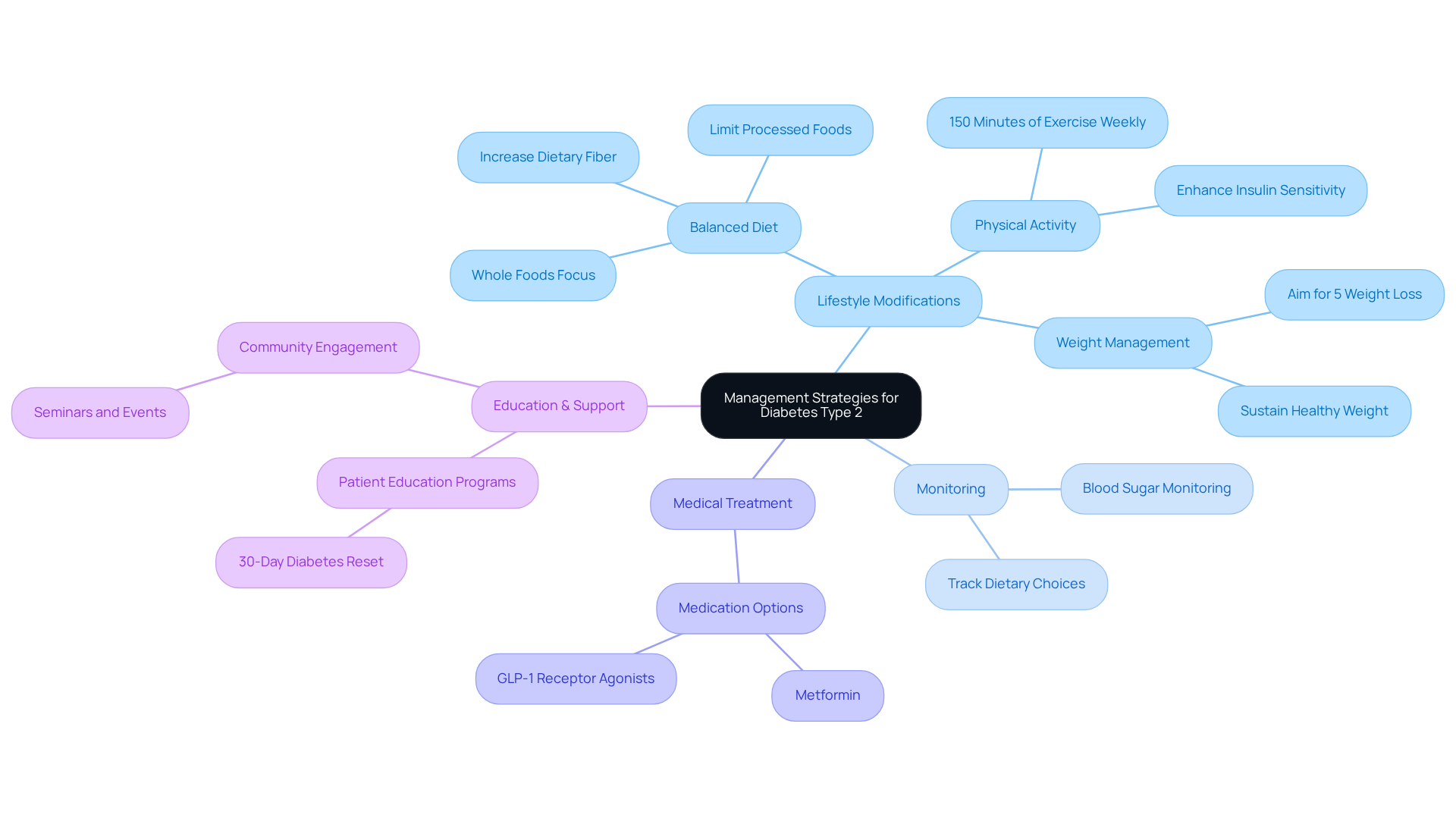Overview
Living with type 2 diabetes can be challenging, often stemming from insulin resistance, obesity, physical inactivity, and genetic factors. This condition leads to elevated blood glucose levels, which can result in serious health complications. It’s important to recognize that you are not alone in this struggle, and understanding the symptoms is the first step toward taking control.
Many patients find that implementing management strategies, such as lifestyle modifications and medical treatment, can make a significant difference. By focusing on healthier habits, you can not only manage your condition but also prevent more serious health issues down the line. Have you considered how small changes in your daily routine could lead to a healthier lifestyle?
The journey to better health is not just about managing diabetes; it’s about embracing a new way of living. We encourage you to explore the 30-Day Diabetes Reset program, which offers supportive guidance and practical tips tailored to your needs. Remember, every step you take toward healthier living is a step toward a brighter future.
Introduction
Understanding diabetes type 2 is crucial, especially in a world where over 589 million adults are affected by this chronic condition. This condition is characterized by insulin resistance and fluctuating blood glucose levels, which can feel overwhelming. It’s important to recognize that many individuals face significant challenges in managing their health in the face of this diagnosis.
This article delves into the multifaceted aspects of diabetes type 2, exploring its causes, symptoms, and effective management strategies. Our aim is to empower you to reclaim your health and navigate the complexities of this condition. With the increasing prevalence of obesity and sedentary lifestyles, you may wonder how to mitigate potential complications and improve your well-being.
Many patients find that understanding their condition is the first step toward effective management. By exploring these insights together, we hope to provide you with the supportive guidance you need on your journey to better health.
Define Diabetes Type 2: Understanding the Condition
Facts about diabetes type 2 indicate that it is a chronic metabolic condition that can feel overwhelming, marked by insulin resistance and a relative lack of insulin. Unlike type 1 diabetes, where the body is unable to produce insulin, individuals with type 2 diabetes can still make insulin, but their bodies struggle to use it effectively. This can lead to higher blood glucose levels, which, if not managed properly, may result in various complications.
It’s important to recognize that this condition is often linked to:
- Obesity
- An inactive lifestyle
- Genetic factors
This makes it a significant public health concern worldwide.
Many patients find that understanding the facts about diabetes type 2 is crucial, as this condition affects millions and can lead to serious health issues like:
- Heart disease
- Kidney failure
- Neuropathy
if not adequately addressed. By acknowledging the challenges you face, we can work together towards healthier living. Remember, you’re not alone in this journey, and there are supportive programs available, like the 30-Day Diabetes Reset, that can help you take control of your health.
Identify Causes and Risk Factors of Diabetes Type 2
The causes of type 2 diabetes can feel overwhelming and are indeed complex and multifactorial. Many individuals grapple with:
- Obesity
- Physical inactivity
- Poor dietary habits
All of which can lead to insulin resistance. It’s important to recognize that genetic factors also play a significant role; those with a family history of this condition may find themselves at a higher risk. Additionally, age is a factor we cannot ignore, as the likelihood of developing type 2 diabetes tends to increase after the age of 45.
Many patients find that ethnicity can further influence their vulnerability, with specific groups like:
- African Americans
- Hispanics
- Native Americans
facing greater risks. Understanding the facts about diabetes type 2, including its causes and risk factors, is essential for developing effective prevention and early intervention strategies. Did you know that over 589 million adults worldwide are currently living with type 2 diabetes? This number is expected to rise significantly in the coming decades.
With over 2 in 5 U.S. adults experiencing obesity, addressing this issue becomes critical for managing blood sugar levels effectively. Dr. Jason Shumard emphasizes the importance of identifying these risk factors, empowering patients on their wellness journey. By taking the time to understand these challenges, you can take proactive steps towards a healthier future.
Recognize Symptoms and Complications of Diabetes Type 2
It’s important to recognize that the signs of diabetes type 2, as highlighted in the facts about diabetes type 2, can arise slowly and may often go unnoticed. It is important to recognize the facts about diabetes type 2, as common symptoms like:
- Increased thirst
- Frequent urination
- Extreme hunger
- Fatigue
- Blurred vision
- Slow-healing sores
are easy to overlook. Many individuals may not pay attention to these early warning signs until they lead to more serious health issues.
If left untreated, type 2 diabetes can lead to severe complications, which are critical facts about diabetes type 2, including:
- Cardiovascular disease
- Nerve damage
- Kidney failure
- Vision problems
For instance, this condition is the leading cause of newly identified adult blindness and accounts for a significant number of kidney failure cases. Recognizing these facts about diabetes type 2 symptoms early is crucial for effective management. Timely intervention can prevent the disease’s progression and reduce the risk of complications.
With approximately 38.4 million Americans affected by this condition, understanding the facts about diabetes type 2 and acknowledging these early signs is vital for improving health outcomes and enhancing quality of life. Remember, you are not alone in this journey, and seeking help can lead to a healthier future.
Explore Management Strategies for Diabetes Type 2
Managing type 2 diabetes can feel overwhelming, but understanding the facts about diabetes type 2 and recognizing that a multifaceted approach can make a significant difference is important. By combining lifestyle modifications, continuous monitoring, and, when necessary, medical treatment, you can take control of your health by understanding the facts about diabetes type 2. A balanced diet, focusing on whole foods, is central to this strategy. Research shows that dietary changes can lead to reductions in fasting plasma glucose and HbA1c levels. In fact, lifestyle interventions can decrease HbA1c by up to 0.15%.
Many patients find that consistent physical activity is equally important. Engaging in at least 150 minutes of moderate-intensity exercise each week can enhance insulin sensitivity and glucose control, reducing the risk of complications related to high blood sugar by up to 58% in high-risk groups. Remember, sustaining a healthy weight is essential; even a modest weight reduction of 5% can lead to a remarkable 69% decrease in the occurrence of drug-treated conditions.
Monitoring your blood sugar levels is crucial for understanding how your dietary choices and physical activity affect your glucose control. In some cases, medication may be necessary to help manage blood sugar levels, with options like metformin and GLP-1 receptor agonists being commonly prescribed. Education and support are vital in navigating this journey, particularly in understanding the facts about diabetes type 2. Programs such as Dr. Jason Shumard’s 30-Day Diabetes Reset provide invaluable tools and information to empower you in taking charge of your well-being.
As Mary Beth Weber wisely states, “Overwhelming evidence shows that lifestyle intervention programs promoting healthy diets, physical activity, and modest body weight reductions can prevent or delay the onset of this condition among high-risk populations.” By embracing these strategies, you can significantly improve your health outcomes and reduce the risk of complications associated with type 2 diabetes. Remember, you are not alone in this journey; support is available, and positive change is within reach.
Conclusion
Understanding diabetes type 2 is essential for anyone looking to manage their health effectively. This chronic metabolic condition, characterized by insulin resistance and a relative lack of insulin, poses significant risks if left unchecked. It’s important to recognize that factors contributing to this disease—such as obesity, inactivity, and genetics—play a crucial role in both prevention and management.
Throughout the article, we’ve shared key insights regarding the causes, symptoms, and management strategies for diabetes type 2. Many patients find that recognizing symptoms early—such as increased thirst, fatigue, and slow-healing sores—can lead to timely interventions that prevent severe complications like cardiovascular disease and kidney failure. Furthermore, embracing a multifaceted approach that includes dietary changes, regular exercise, and continuous monitoring can empower individuals to take control of their health journey.
The significance of understanding diabetes type 2 cannot be overstated. With millions affected worldwide, proactive measures and education are vital in combating this public health crisis. Engaging in lifestyle modifications, seeking support through programs like the 30-Day Diabetes Reset, and staying informed about the latest statistics and management options can lead to healthier outcomes. Taking these steps not only enhances personal well-being but also contributes to a broader effort to address the growing diabetes epidemic. Remember, you are not alone on this journey, and every small step you take matters.
Frequently Asked Questions
What is diabetes type 2?
Diabetes type 2 is a chronic metabolic condition characterized by insulin resistance and a relative lack of insulin, leading to higher blood glucose levels.
How does diabetes type 2 differ from type 1 diabetes?
Unlike type 1 diabetes, where the body cannot produce insulin, individuals with type 2 diabetes can still produce insulin but struggle to use it effectively.
What are some common factors associated with diabetes type 2?
Common factors linked to diabetes type 2 include obesity, an inactive lifestyle, and genetic factors.
Why is diabetes type 2 considered a public health concern?
Diabetes type 2 is a significant public health concern because it affects millions of people and can lead to serious health issues if not properly managed.
What complications can arise from unmanaged diabetes type 2?
Unmanaged diabetes type 2 can lead to serious health complications such as heart disease, kidney failure, and neuropathy.
Are there support programs available for individuals with diabetes type 2?
Yes, there are supportive programs available, such as the 30-Day Diabetes Reset, that can help individuals take control of their health.



